After fighting for Oklahoma Survivors act, artists and advocates awaited veto response with installation
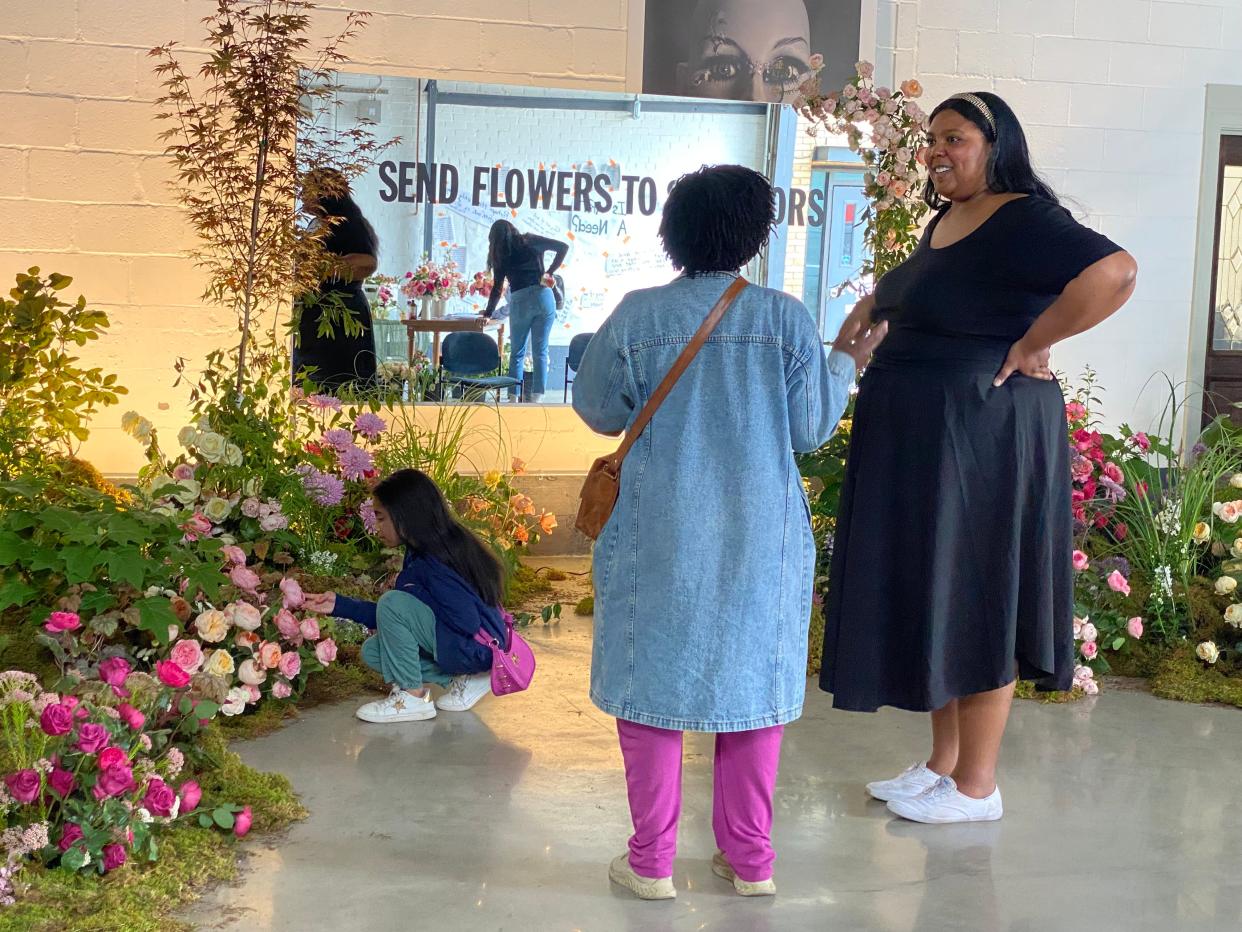
A mirror emblazoned with the words "Send Flowers to Survivors" sat nestled among greenery and florals arranged to feel like a garden.
The mirror reflecting life back at those who entered the space and reminding them as they visited the otherwise sparsely decorated warehouse that beauty can flourish in life's unexpected places and moments.
The piece — the third large scale community care installation of its kind by The Wild Mother Creative Studio, an Afro-Indigenous, woman-owned boutique floral design studio — is an ode and tribute to criminalized survivors of domestic violence. It was in the works for some time, but opened just two days after the passing of Senate Bill 1470 out of the Oklahoma House of Representatives.
The bill, called the Oklahoma Survivors' Act, would allow a person's history with domestic violence to be taken into consideration as a mitigating factor in their sentencing, a step in the right direction for advocates of those incarcerated following acts of self defense against their abusers, supporters say. The bill passed the Senate unanimously in March, nearly doing the same April 17 in the House, where it passed 84-3.
Tuesday, the governor vetoed the bill, saying the bill would "create a sword by which criminal defendants will fight the imposition of justice based on prior abuse," causing the advocacy community to respond, calling that understanding of the bill's policy "factually incorrect."

"This bill is the product of two years of sustained advocacy by domestic violence victims, domestic violence service providers, human trafficking shelters, lawyers for survivors of abuse, directly-impacted survivors, conservative think tanks and advocates across the state. The bill has been lauded locally and nationally, by conservatives and liberals, as commonsense sentencing reform," the The Oklahoma Survivor Justice Coalition said in a statement. "Advocates have heard this misinformation from the state’s prosecutors and the District Attorneys Council for two years.
"Contrary to their claims, the bill does not provide an eject button or a loophole for violent offenders to get free. It never has and it never will."
Responding swiftly to the governor's veto, the Oklahoma Senate voted 46-1 to override the veto and advocates now wait to see if a final vote will be called by the Oklahoma House.
If Oklahoma's bill is overridden and becomes law, it would be only the second state in the nation behind New York, which enacted its own domestic violence survivor's law in 2019, according to reporting by The Oklahoman's Dale Denwalt in March.
“We cannot afford to leave behind survivors of domestic abuse in a state that ranks first in the country in the perpetration of domestic violence and third in domestic homicides. The Oklahoma Survivors Act enjoys widespread, bipartisan support throughout the state and throughout the country, and it’s long past time to begin implementing this critical legislation,” said Colleen McCarty, co-founder of the Coalition and Executive Director of Oklahoma Appleseed.
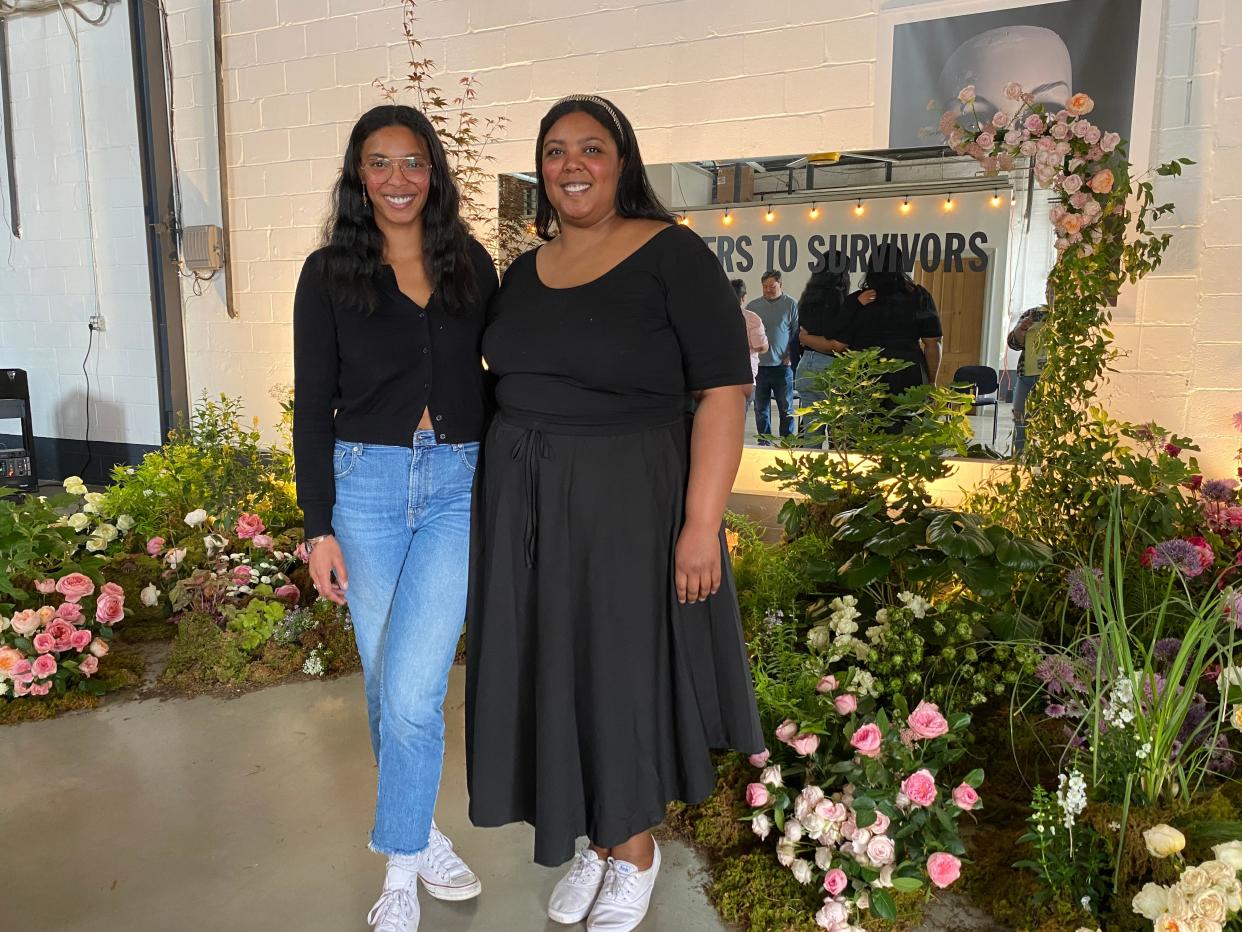
Send Flowers to Survivors organizers, artists saw early legislative support for bill as a victory
At the time of the flower installation, the artists were still in awe of the overwhelming support the bill had received in the Oklahoma House and Senate.
"It felt like a movie, a little bit on Wednesday (April 17, when the bill passed the House), after all of the work, putting this together, trying to spotlight the stories of the survivors who are currently incarcerated. But also, it's so crazy, as we have started talking about this on our platform, it's insane how many people have reached out and said, 'Oh yeah, me too, I'm a survivor, I'm a survivor,'" Lauren Palmer said.
"To get to Wednesday and there was, the really big celebratory moment out of the Senate, that was so encouraging and energizing. I think this feels more like a celebration today, even though our Kinfolk are incarcerated, it's still a step. And I tend to be a glass half-full type of person, so that gives me hope. As a Black and Indigenous woman living on Native land, I have to look for the hope."
Lauren and her sisters — Leah and Callie — make up The Wild Mother. They partnered with Oklahoma Appleseed Center for Law and Justice, OK Survivor Justice Coalition, Sugarfree Media, and Spark! Creative Lab along with other florists, farmers and more to bring the installation to life.
"We have a few freelancers who helped us build this installation," Callie Palmer said. "We got over 700 roses donated to us."
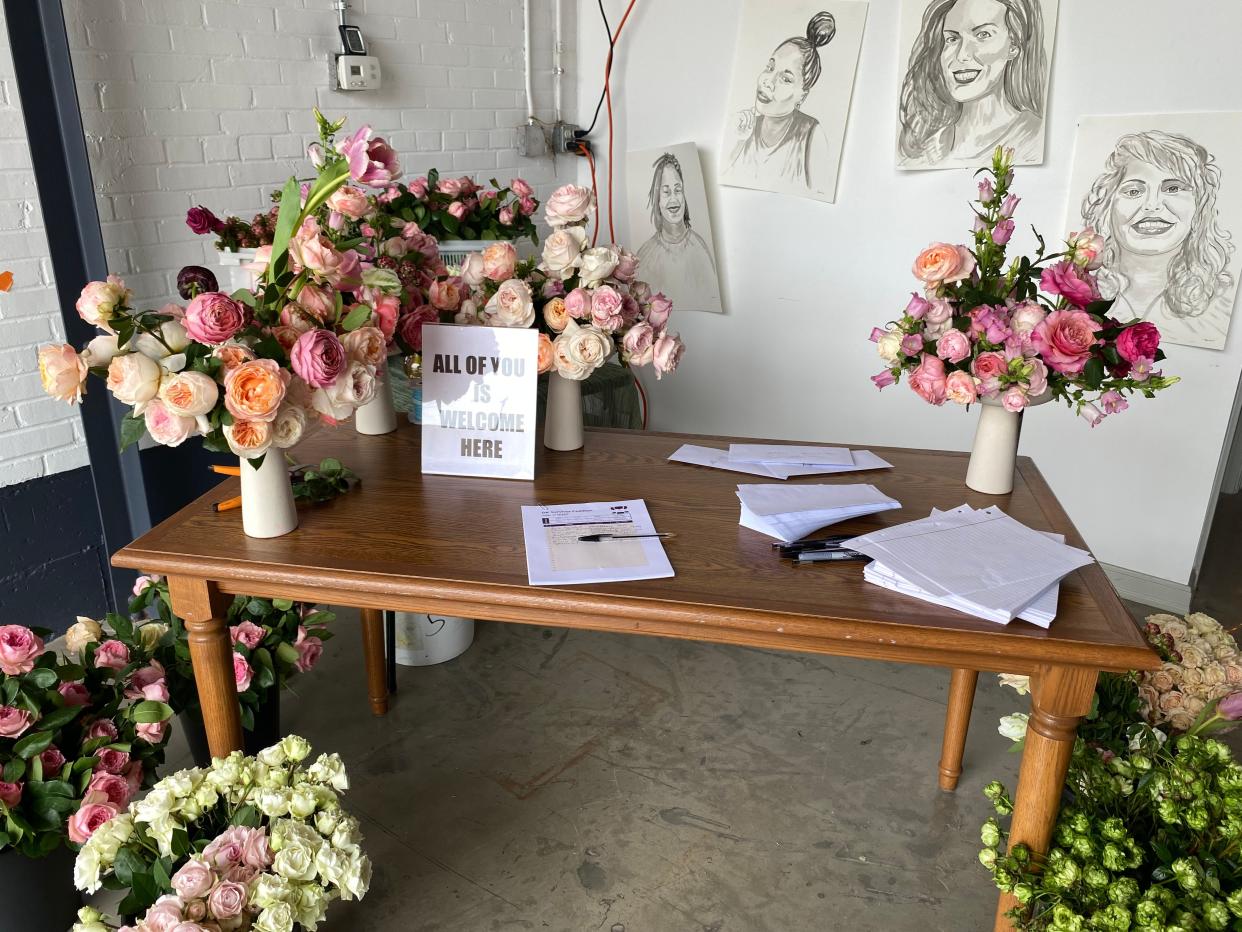
With a firm belief that art is medicine, the sisters look to use their floral art as a means for healing and providing voices for some of those who inspired the Send Flowers to Survivors installation. Those like Erica Harrison, Keabreauna Boyd and April Wilkens, who are all incarcerated survivors of domestic violence, women whose stories of facing prosecution after defending themselves directly impacted the story told through the installation.
Callie Palmer said the reality of being outside while people remain incarcerated for having defended themselves during domestic violence situations and being able to support them means everything to her as an artist.
"Art tells a greater story of what's happening in the community. And so, it's also, I've been saying this a lot, it's also a message of love," said Callie Palmer.
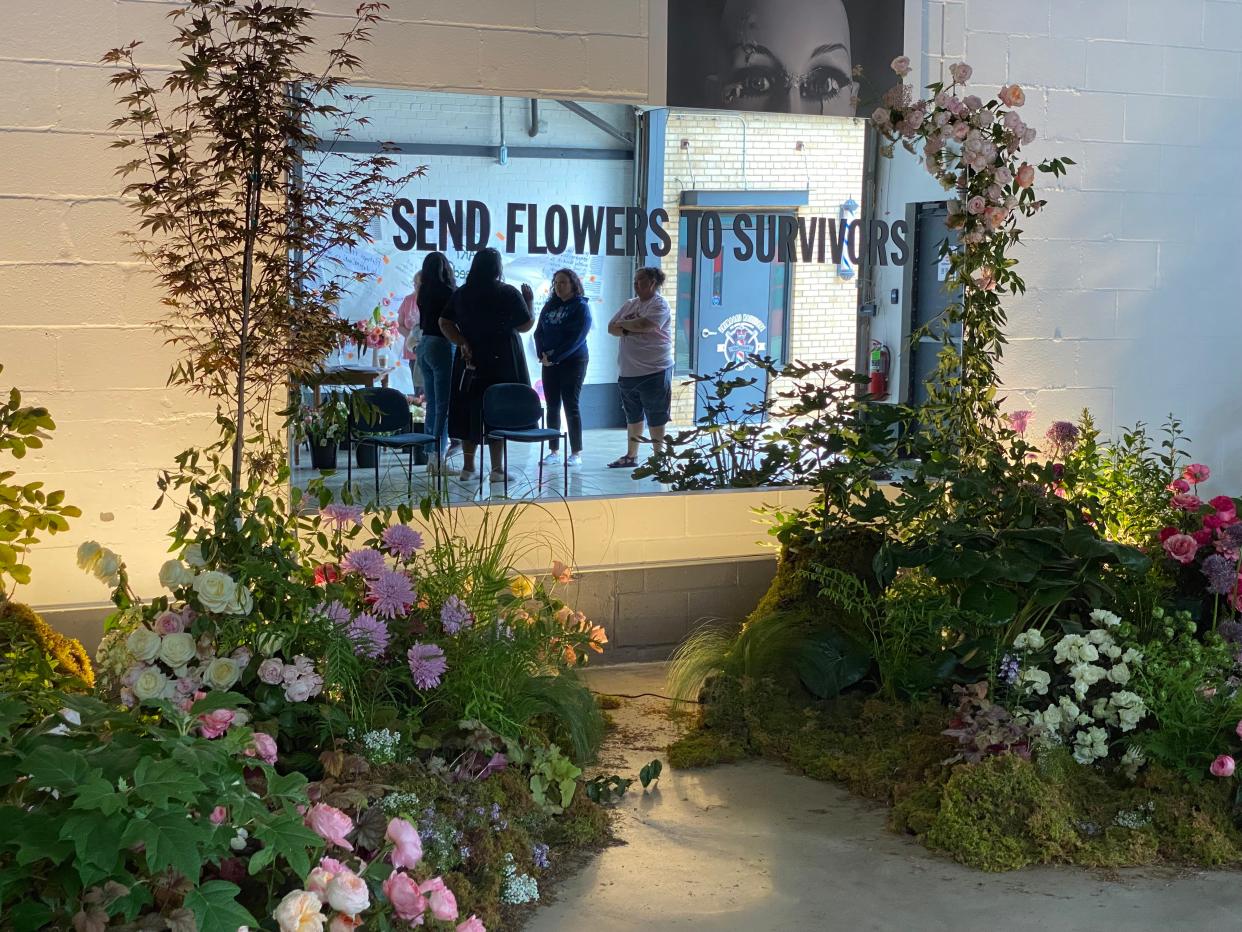
A generational connection to the earth and its beauty
For the Palmers, a love for plants and a connection to the Earth have been in their family for generations.
"As Afro-Indigenous people, having a relationship with the land is nothing new to us and so, growing up, my grandmother, my great-grandmother, her mother and her mother — it just goes all the way back — taught us a lot about flowers, and they grew them," Callie Palmer said.
"My Gigi Mama on my dad's side, she had a rosebush, and after she died — her house burned down, and then she passed away — but the rosebush is something that stayed. My grandfather uprooted that rosebush, and I don't know how he did it because he's blind, and he planted it in his house ... it was a sign of his love to her."
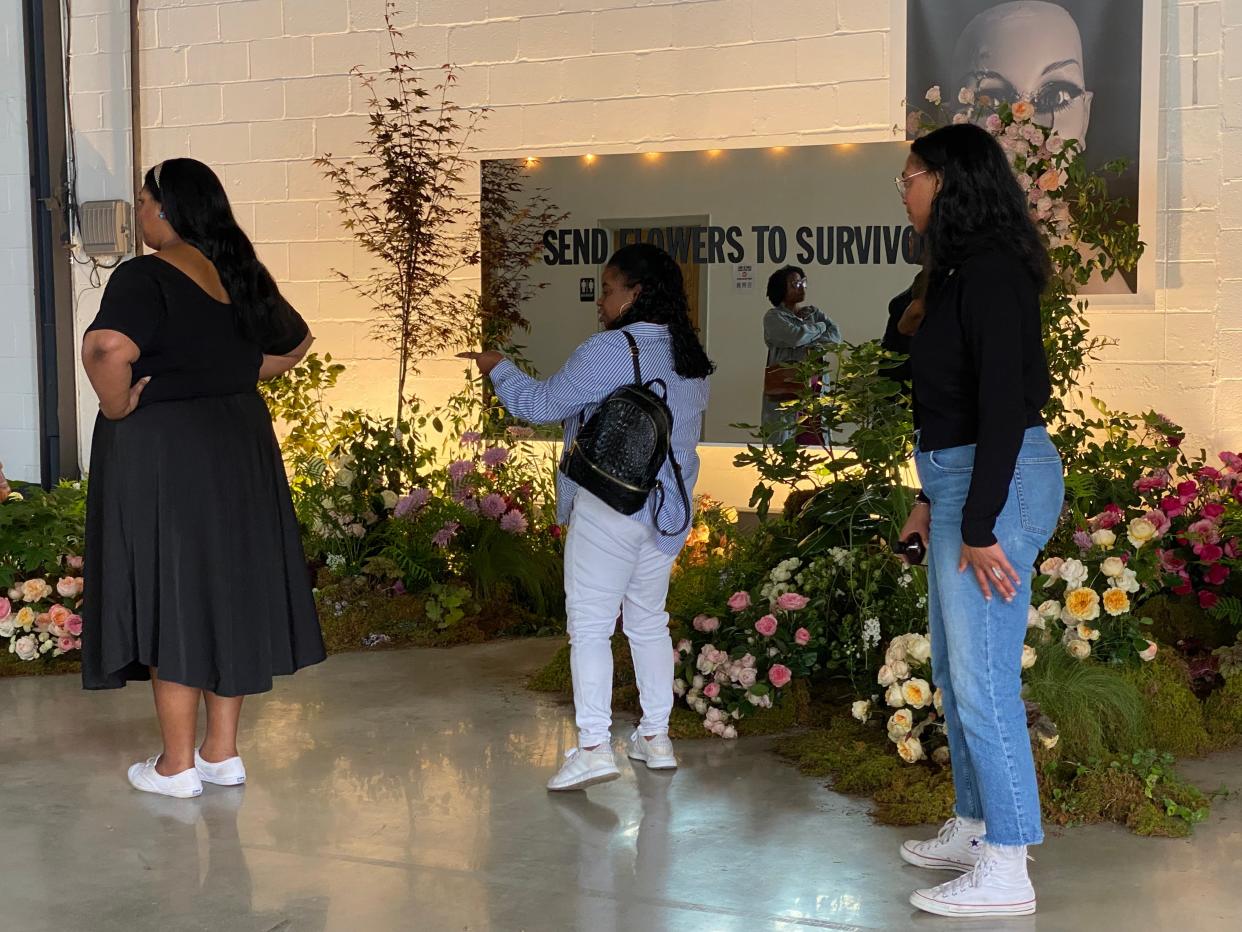
The Wild Mother's past work raising awareness through installations
The piece is the third in The Wild Mother's "Send Flowers To" series of community care through floral art which began with Send Flowers to Greenwood, a piece the Palmer sisters began to envision during the pandemic.
"This is something that still feels really tender to me, but the fact that we weren't taught about Greenwood in school and we're just a stone's throw away from Tulsa," Lauren Palmer said. ""The fact that, you know, I was learning along with the rest of Oklahoma and the country and the world, I wanted to provide an even bigger spotlight for my industry to see what Greenwood once was and the spirit that still remains."
Lauren Palmer said only about 2% of florists are Black and less than 1% are Native, which made it even more important for the sisters to share the stories of Greenwood in 2021 and Missing and Murdered Indigenous Women, or MMIWs, within the florist community.
"There's something really interesting about the fact that there was a lot of hype around a Black issue in 2021, but then when we were presenting some parts of MMIW, it felt like pulling teeth to get people to even care," Lauren Palmer said. "We're researchers at heart, so 'What is at play there? Why?' I don't know, more than anything I feel like as we present these site-specific, large-scale installations, we're learning a lot about the home that we live in, the people that are all around us."
Lauren Palmer said she, Callie and Leah, who currently lives in the Seattle area and works remotely with her siblings, are constantly searching for the next source of inspiration.
"I think our focus for next year will be around conservation and sustainability. We have supported and highlighted people, but also in all of my family traditions, there's lots of teachings around our plant and animal nations being Kinfolk, too," Lauren Palmer said.
To learn more about The Wild Mother Creative Studio, follow @thewildmother on Instagram or go to www.thewildmother.com.
This article originally appeared on Oklahoman: Advocates awaited override to Kevin Stitt's veto of SB 1470
